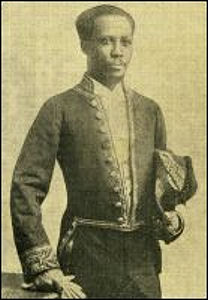
Henri Christophe was a key leader in the Haitian Revolution and the only monarch of the Kingdom of Haiti.

Jean-Jacques Dessalines was a Haitian revolutionary, the leader of the Haitian Revolution, and the first ruler of an independent Haiti under the 1805 constitution. Initially regarded as governor-general, Dessalines was later named Emperor of Haiti as Jacques I (1804–1806) by generals of the Haitian Revolution Army and ruled in that capacity until being assassinated in 1806. He has been referred to as the father of the nation of Haiti.

Alexandre Sabès Pétion was the first president of the Republic of Haiti from 1807 until his death in 1818. One of Haiti's founding fathers, Pétion belonged to the revolutionary quartet that also includes Toussaint Louverture, Jean-Jacques Dessalines, and his later rival Henri Christophe. Regarded as an excellent artilleryman in his early adulthood, Pétion would distinguish himself as an esteemed military commander with experience leading both French and Haitian troops. The 1802 coalition formed by him and Dessalines against French forces led by Charles Leclerc would prove to be a watershed moment in the decade-long conflict, eventually culminating in the decisive Haitian victory at the Battle of Vertières in 1803.

The flag of Haiti is the national flag of the Republic of Haiti. It is a bicolour flag featuring two horizontal bands coloured blue and red, emblazoned by a white rectangular panel bearing the coat of arms of Haiti. The coat of arms depicts a trophy of weapons atop a green hill and a royal palm symbolizing independence. The palm is topped by the Cap of Liberty. The motto L'Union fait la Force appears on a white ribbon below the arrangement.

Félix Morisseau-Leroy was a Haitian writer who used Haitian Creole to write poetry and plays, the first significant writer to do so. By 1961 he succeeded in having Creole recognized as an official language of Haiti, after expanding its teaching in schools and use in creative literature. Morisseau also published works on French, Haitian Creole and Haitian French literature. He worked internationally, encouraging the development of national literature in post-colonial Ghana and Senegal. In 1981 he settled in Miami, Florida, where he was influential in uniting the Haitian community around Creole and encouraged its study in academia.

Jacques Stephen Alexis was a Haitian communist novelist, poet, and activist. He is best known for his novel Compère Général Soleil (1955).

Massillon Coicou was a Haitian poet, novelist, playwright, and politician. Born in Port-au-Prince, Coicou was educated in a Catholic school for boys. He was appointed as the Haitian Chargé d'Affaires Étrangères for the Haitian Republic in France, where several of his works were published. Opposed to the presidency of Pierre Nord Alexis, Coicou publicly announced his intentions to overthrow Nord Alexis' government. He and his two brothers were subsequently executed by the President's orders on the night of 14–15 March 1908.
Choucoune is an 1883 poem by Haitian poet Oswald Durand. Its words are in Haitian Creole and became the lyrics to the song Choucoune, later rewritten in English as Yellow Bird, based on the words "ti zwazo" from the Durand poem.
"Choucoune" is a 19th-century Haitian song composed by Michel Mauléart Monton with lyrics from a poem by Oswald Durand. It was rewritten with English lyrics in the 20th century as "Yellow Bird". Exotica musician Arthur Lyman made the song a hit in 1961.

Josaphat-Robert Large was a Euro-Haitian-American poet, novelist and art critic. His novel Les terres entourées de larmes [Shore surrounded with tears] won the prestigious Prix littéraire des Caraïbes in 2003. He was nominated for the Haitian grand Literary Prize of 2004, together with Edwidge Danticat, René Depestre, Frankétienne, Gary Klang, Dany Laferrière and Leslie Manigat.

The First Empire of Haiti, officially known as the Empire of Haiti, was an elective monarchy in North America. Haiti was controlled by France before declaring independence on 1 January 1804. The Governor-General of Haiti, Jean-Jacques Dessalines, created the empire on 22 September 1804. After being proclaimed emperor by the Generals of the Haitian Revolution Army, he held his coronation ceremony on 6 October and took the name Jacques I. The constitution of 20 May 1805, set out the way the empire was to be governed, with the country split into six military divisions. The general of each division corresponded directly with the emperor or the general in chief appointed by the emperor. The constitution also set out the succession to the throne, with the crown being elective and the reigning emperor having the power to appoint his successor. The constitution also banned white people, with the exception of naturalised Germans and Poles, from owning property inside the empire.
Haitian literature has been closely intertwined with the political life of Haiti. Haitian intellectuals turned successively or simultaneously to African traditions, France, Latin America, the UK, and the United States. At the same time, Haitian history has always been a rich source of inspiration for literature, with its heroes, its upheavals, its cruelties and its rites.

The Haitian Declaration of Independence was proclaimed on 1 January 1804 in the port city of Gonaïves by Jean-Jacques Dessalines, marking the end of 13-year long Haitian Revolution. The declaration marked Haiti becoming the first independent nation of Latin America and only the second in the Americas after the United States.
Abdaraya Toya "Victoria Montou" was a Dahomey warrior and freedom fighter in the army of Jean-Jacques Dessalines during the Haitian Revolution. Before the Revolution she and Dessalines had been enslaved on the same estate, and the two remained close throughout her life, with Dessalines calling her his aunt.
Michel Mauléart Monton (1855–1898), was a Haitian musician, pianist and composer. He became famous for composing the music for the méringue classic, choucoune
Quand nos Aïeux brisèrent leurs entraves was the unofficial national anthem of Haiti from 1893 to 1903. The lyrics were written by Oswald Durand, a Haitian writer and poet.
Occide Jeanty (1860–1936) was a Haitian composer, trumpeter, pianist and music director.
Kreyol La is a Haitian compas band. The group has performed throughout the world, most notably in the Caribbean, Canada, France and the United States through various concerts, carnivals, and festivals.










